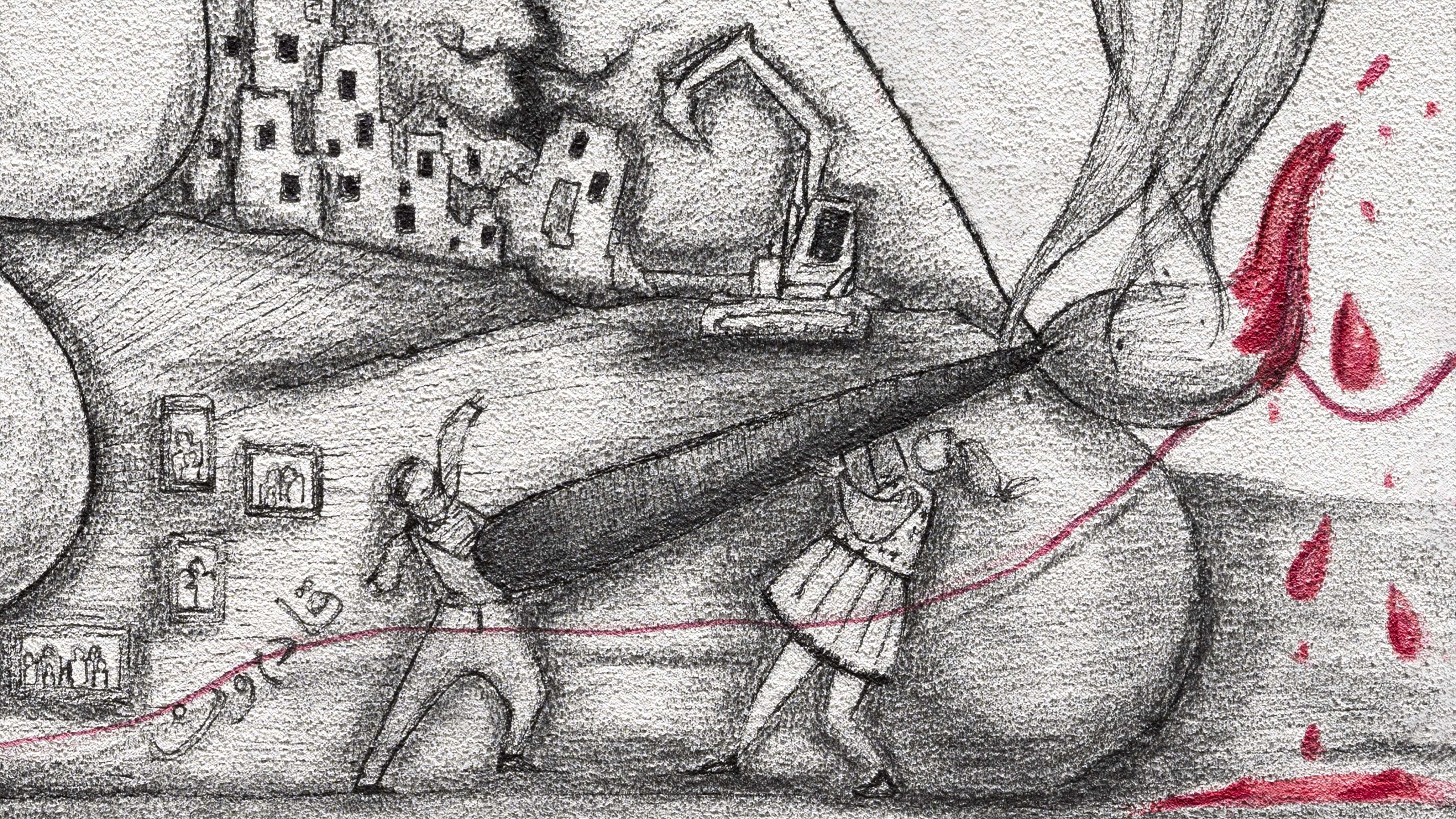Amidst the challenges of growing up in Iraq during the 1990s, our family meals were oases of warmth and gratitude. The blessing of sharing a meal with loved ones in a war-torn country was never taken for granted. Food was treated with reverence; leftovers were shared with those in need, and I still recall the homeless man who knew to knock on our door every afternoon asking us for a warm plate. Even fish and chicken bones found their way to stray animals. The women in our family would gather around the sink after meals, hand-washing dishes as they told stories. We drank water, a precious resource, straight from the tap or, on occasion, through a simple filter. Power blackouts were common, and we learned to enjoy playing cards by the evening candlelight. Conserving resources was second nature to us, ingrained in our daily habits.
As my family now lives in the United States, I can't help but feel a pang of disappointment as I witness the erosion of those once-cherished habits. While the safety and peace of their new home are priceless, I struggle when seeing how some of the sustainable practices of the past have given way to new, less eco-friendly routines. Food remains might end up discarded, single-use plates and cups have become commonplace, and bottled water in plastic containers has replaced the simplicity of tap water. The constant hum of air conditioning stands in stark contrast to the careful energy use of our past. Though I'm deeply grateful for the daily absence of bombs, I still wonder if, in the process, we've lost touch with something valuable and profound.
Perspectives from Environmental Psychology
These reflections have guided me in building an academic research career at the intersection of environmental sustainability, behavioral psychology, and socioeconomic development. I find it ironic that, while my work constantly exposes me to the worrying realities of looming ecological catastrophes and I strive to share my findings and writings with loved ones, this knowledge hasn't necessarily translated into more sustainable habits in my surroundings. Meanwhile our ancestors, who were often perceived as “ignorant” or “uncivilized” by colonists and western powers remain a model example of living in harmony with nature. This realization has spurred me to delve deeper into the psychological factors that contribute to the knowledge-behavior gap in environmental action. While institutional and political powers remain major shapers of environmental outcomes, we must also examine the inner workings of our minds that shape our actions and behaviors beyond that. Unraveling these complexities is a crucial step toward bridging the gap between environmental knowledge and action, moving from passive awareness to active impact. So where does the gap come from? Here are some answers based on my own research in the fields of behavioral and social psychology:
"We all speak Arabic at home"
19 March 2024
- The Search for safety
Many existential threats to nature today are gradual and long-term, requiring strategic thinking rather than immediate reactions. While rational thinking and data-driven actions are crucial for human success, our brains are often wired for quick, emotional fight-or-flight responses as these have (historically) helped us survive immediate threats, such as escaping predators. Exposure to trauma, such as conflict or displacement, can reinforce such emotional responses and limit the brain’s capacity for reflective and energy-intensive decision-making. Additionally, change may be perceived as risky and trauma may induce long-term risk-aversion. This in turn can make changing behavior quite challenging, especially for those who have already experienced significant life changes. A high sense of insecurity can also stand in the way of developing empathy and caring behavior for living beings that we may not personally identify with subconsciously (e.g. animals, trees or strangers in general).
- The Finite Pool of Worry
When attention for one risk increases, focus on other risks often decreases, as if humans only have a limited capacity for worrying at a given time. For example, when the mind is primarily concerned with an issue such as conflict, poverty or injustice then it would automatically focus less on issues such as the environment or climate change.
- Pluralistic Ignorance
Many people for whom environmental protection is important underestimate how much their views are shared in society. As a result, they also underestimate how many other people are prepared to act in an environmentally friendly way. This misjudgment is a psychological phenomenon known as pluralistic ignorance among researchers. This misperception can create a cycle of silence, where people hesitate to voice their beliefs, thinking they are in the minority. This lack of discussion can lead to decreased motivation to act. Additionally, we often base our actions on others' behavior, especially when the benefits are collective rather than individual. No one wants to be the only one contributing without seeing others' efforts, as this can lead to feelings of naivety or foolishness. This fear can lead to imitating others' behavior to avoid social rejection, particularly when significant effort has been invested in integrating into a new society.
- Social Norms
Collectivist cultures often prioritize societal expectations and traditions, which can make it difficult for individuals to adopt practices that deviate from the norm. Within families, these pressures can be especially strong, causing fear of disapproval or disappointment. For instance, individuals who wish to adopt a vegetarian diet in meat-eating families may face resistance and skepticism. Similarly, those who choose a low-waste lifestyle, such as purchasing second-hand clothing, may feel conflicted between their beliefs and the desire to avoid upsetting family when their norms center around high fashion standards. This cognitive dissonance may be resolved by compromising and conforming to norms that contradict one's own beliefs, merely to alleviate guilt and gain approval, particularly when individuals feel that their loved ones have already been through difficult times and don't want to cause additional stress.
- Avoidance and Defensive Denial
After a lifetime of confronting threats and crises, finally achieving a sense of safety can lead to an aversion towards new narratives of catastrophe and danger, particularly if they seem distant or abstract. This tendency can be especially strong when these narratives, such as warnings about environmental crises, evoke feelings of hopelessness or low self-esteem, strengthening the desire to disconnect from the topic and focus on maintaining personal peace and stability. This avoidant behavior may be a self-protective mechanism that allows individuals to preserve their mental well-being by limiting their engagement with potentially distressing information.
‘Palmyra syndrome’: What are Syrians allowed to speak about amid war and revolution?
02 April 2021
Why Gender Matters
In Arabic societies, among others, women are seen as the safety and comfort providers for their families. As caregivers, women are socially conditioned to worry about their children and loved ones, deprioritizing whatever else might happen in the world. Additionally, they often face patriarchal pressures to conform to norms and limited freedom to explore and engage in worldly topics compared to men. This may lead to a vicious cycle of low self-esteem and disempowerment. Additionally, pluralistic ignorance may be associated with gender, as women are often excluded from decision-making positions. This may lead them to believe that their ideas or concerns are not valued or heard, hence conform with the perceived dominant (masculine) perspective as they underestimate how many others indeed share their thoughts.
Despite the challenges they face, women in Arab societies do play a critical role in driving sustainability. Their traditional roles as teachers, cooks, and shoppers provide them with unique opportunities to educate and raise awareness about environmental issues, prepare sustainable meals, and make eco-friendly purchasing decisions. Furthermore, traditional notions about masculinity may discourage men from engaging in "feminine" activities such as gardening or recycling, while women’s involvement in activities such as farming gives them a deeper understanding of local ecosystems and environmental challenges. Additionally, the association of women with emotionality can lead to fewer social stigmas around seeking mental health support, allowing them to enhance their psychological well-being and develop the mental capacity to adapt to new behaviors outside their comfort zone and break down barriers.
Bridging the Gap
While systemic reforms, policy measures, technological innovations, and environmental education are crucial components for promoting environmental action, true change cannot be achieved without individuals adopting more sustainable practices, which necessitates a combination of top-down and bottom-up strategies. Behavioral change is highly dependent on narratives and storytelling approaches. Effective communication is crucial for changing people's behavior and promoting environmental engagement. Stories and facts that evoke emotional responses and align with social norms are more impactful than pure statistics that require intensive cognitive effort.
Additionally, focusing on communicating some of the “wins” in the sustainability transition might prove powerful. For instance, shifting from narratives of “climate change will destroy us all” to success stories of eco-innovations, inspiring grassroots initiatives and role models, particularly women, may help combat feelings of avoidance and powerlessness and enhance environmental engagement. By understanding what others know, individuals can also overcome pluralistic ignorance and recognize that they are not alone in their concerns, which may translate into more action taking.
Access to mental health support, particularly in post-trauma situations, is also essential for enhancing emotional stability and empathy, which in-turn may translate to higher pro-environmental behavior, as well as the mental capacity needed for rational and calculative decision-making. This is essential now more than ever given the rapidly changing world in which we live, thanks to digitalization and the associated information overload, communication speed, and lifestyle changes, pushing us more and more into reactive situations and rash decision-making. Improved psychological health and wellbeing promote reflection and long-term orientation beyond mere focus on immediate gratification and band-aid problem-solving, while enhancing one’s self-esteem and confidence to practice behaviors that may not conform with the norm. Although this is relevant for all genders, initiatives targeting women may be particularly necessary to enhance their agency in male-dominated societies. Finally, changing social norms is key to promoting environmental sustainability, but this requires individuals to take initiative and lead by example. Empowering women is particularly important in this endeavor, as their unique perspectives and experiences can bring about meaningful change.
As I reflect on the journey from the humble yet sustainable practices of my Iraqi upbringing to the complexities of environmental behavior in my current context, I am reminded of the profound connection between our past experiences and present actions. I now realize that the eco-friendlier behaviors of my family in Iraq were out of solidarity and gratitude, and perhaps even necessity, rather than an environmental mindset. They serve as a poignant reminder of the interconnectedness of resource conservation and community support and the double-edged sword of social norms. I see it as a prime example of the intersectionality of social and environmental sustainability; social justice and ecological health. I also know now that transforming our individual habits and actions requires collective effort, rooted in effective communication, fostering empathy and mental health, and the empowerment of marginalized voices. Therefore, even if my research has not entirely succeeded in helping me reactivate family’s past behaviors, I certainly accept and understand them more profoundly, which is a stepping stone towards healthier communication and learning amongst each other. I will strive to honor the memories of the past while embracing the possibilities of the future, even if that means that I might have to eat dolma out of a disposable plate, accept a drink of water out of a plastic bottle, or put on a sweater to tolerate excessive air conditioning in summer months whenever we get together.









